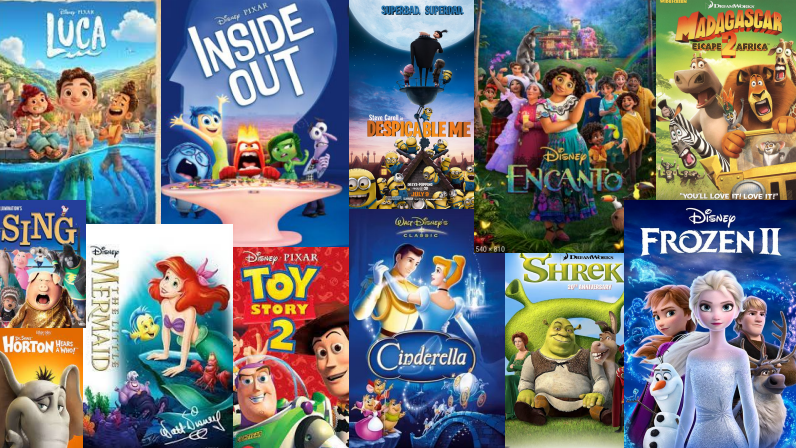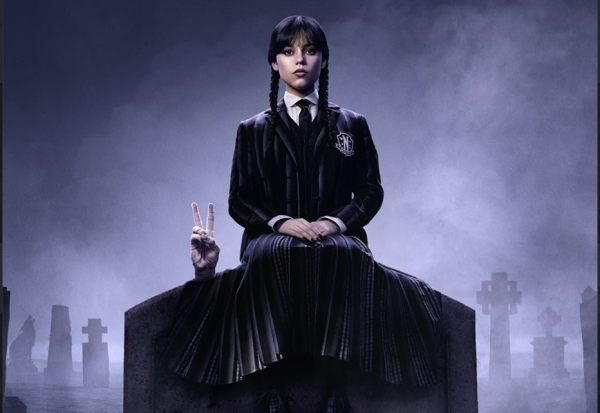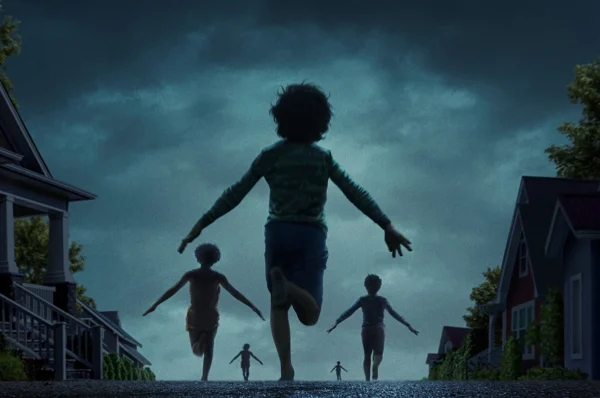Opinion: Kids’ movies are getting deeper and it’s actually a good thing
We all remember our favorite childhood movies. We can watch “Toy Story 2” or “Shrek” countless times and never get bored. But these movies were not just fun entertainment. Children’s movies are important to society not only for their cultural impact but also their ability to influence children– and their themes are changing for the better.
The messages of “being true to yourself” and “kindness and caring for others” have run true through many of the classics. However, as time has progressed, these movies have explored much more complex ideas and themes. Films such as “Inside Out,” “Frozen 2” and “Encanto” are just some of the recent movies that have dealt with such themes, including depression, loneliness and generational divides. Although some claim that these movies are too complex for children to understand and include topics that are too mature to introduce to a younger audience, children can and should interpret these important lessons.
These movies have different target audiences, largely due to the increasing popularity of streaming services. The ability to play movies from the comfort of your home instead of in the theater introduces a new way to create, market and sell a movie. A variety of new Disney and Pixar releases have gained their popularity on Disney+ from larger audiences, regardless of age.
Three movies that went straight to Disney+, including “Luca,” “Turning Red” and “Soul”, were popular with a variety of audiences for different reasons. Both “Luca” and “Turning Red” are coming-of-age films about figuring out who you are and embracing it. But these films both serve a unique look into cultures and new ways of life not typically seen.
“Turning Red,” released in March 2022, focuses on a Chinese-Canadian girl, Mei, and how she navigates being a female teenager in 2002. The movie explores many cultural elements of being a female Chinese-Canadian and was heavily influenced by members of the creative team. Director Domee Shi explained why the movie was so important and close to her in the “Turning Red” documentary “Embrace the Panda”.
“When I first started this movie, I was really determined to make something different. The inspiration behind “Turning Red” comes from my own life growing up as a dorky Chinese Canadian girl in Toronto, Canada and being the only child of my very overprotective mom and dad. There’s so many elements of Mei in me,” Shi said.
Including Shi, “Turning Red” is the first Pixar film to feature an all-women leadership team. The movie includes an honest portrayal of menstrual cycles, boy crushes and female emotion that is not typically explored in kids movies. These movies teach children relatable messages while introducing them to a variety of lifestyles and human experiences, and telling them that it’s okay to talk about them.
“Soul,” on the other hand, felt more adult and complex in its themes. It explored the development of the human soul and the idea that materialistic achievements don’t define you. The main character, Joe, struggles with “adult” issues. He is unhappy in his job and struggles with supporting both his family and his love for music. Despite the mature theme, kids can still learn to appreciate the small things in life from the movie. We follow the journey of 22, the new soul, as she navigates life and begins to appreciate the simple things in life such as the taste of pizza for the first time or the changing of the seasons. Kids can start by relating to those simple messages, while adults can watch for the more complicated themes of the human soul.
Different ages interpret these films and their messages differently, as showcased by Pixar’s 2015 film “Inside Out.” Director, writer and Pixar legend Pete Docter’s original intentions were not to make a movie to teach children about their emotions, but to put something on screen that had never been seen before.
“The thing that attracted me to it was the fun and the chance to take people places that everyone was sort of familiar with on one level, but had never seen visualized… And that would allow us to have characters that represent emotions. And that felt like, man, that’s exactly what animation does best — strong, opinionated, caricatured personalities. And that just got me excited,” Docter said.
The exciting thing about “Inside Out” is the many ways you can interpret the movie. Many people take away from the concept like Docter did. I connected to it on an emotional level. In the same interview with David Bianculli, Docter also told a story about a coworker’s son. This boy had been taking swimming lessons and couldn’t dive off of the diving board. After seeing “Inside Out,” he finally jumped off and cited the movie as a reason for his confidence and moving past his fear.
“And for us, we were sort of blown away. Not only did he get the film, but it was actually making an impact in his life. That was, like, the ultimate receipt,” Docter said.
This fear that these more complex themes are too hard for kids to understand is unfounded. Young kids are able to connect ideas and messages presented in these movies to their own lives, no matter how complex, and adults can do the same. These movies impact everyone differently, including the creators of the movies themselves. Writer, director of “Frozen” and Chief Creative Director at Walt Disney Animation Studios Jennifer Lee explained how the character of Anna and children’s movies she grew up with has impacted her in the Disney+ documentary “Into the Unknown”.
“Anna’s the character for me that has this element of things I coped with growing up. Things I’ve coped with in life that I never saw quite on screen the way I wish I could’ve as a child. I talk a lot about Cinderella being that for me when I was bullied… she was such a good person and it would say [to me], ‘don’t believe the bullies, you’ve got this,’” Lee said.
Our favorite movies growing up will stay with us for the rest of our lives. The messages they teach, whether simple or complex, are impactful and important for children’s development. As the landscape of childrens’ movies changes, it’s important that we see the value in the shift towards real and emotional themes.

Grace is a senior at North and is thrilled to begin her second year of The North Star as Managing Editor. She’s excited to pursue her own journalistic...











